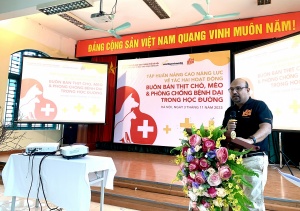A training conference was held in Hanoi on October 28 to discuss how to strengthen rabies control and facilitate the transition of the dog and cat meat trade.
 |
The event was held by Hanoi Sub-Department of Animal Husbandry, Aquaculture, and Veterinary Medicine (under the Hanoi Department of Agriculture and Environment), in collaboration with Soi Dog Foundation and Vietnam Social and Behaviour Change Communication for Sustainable Development Company (SBCC Vietnam).
The conference was part of a project approved by Hanoi People’s Committee on July 24. The initiative aims to contribute to implementing a national target of zero human rabies deaths by 2030, while enhancing management capacity, disease control, and gradually adopting animal welfare standards in line with international practices.
Discussions focused on the state management of rabies prevention and control; strengthened inter-sectoral coordination in controlling animal and animal product trading and transportation; assessing the link between dog and cat trading and slaughtering with rabies transmission risks; developing strategies towards the goal of zero human rabies deaths by 2030; and communication solutions and livelihood transition support for dog and cat meat business owners.
According to data from the Vietnam Animal Health Information System, from the beginning of the year to date, rabies has been recorded in 157 communes across 24 cities and provinces, with 323 dogs and cats collected. Regarding human rabies, according to reports from the National Institute of Hygiene and Epidemiology, as of September 8, the country had recorded 57 suspected cases or deaths from rabies in 18 provinces and cities. These figures show that the rabies situation remains complex and requires more synchronised and effective intervention measures.
Attendees received updated information and technical guidance on rabies exposure management, animal vaccination techniques, as well as discussions on inter-sectoral cooperation experience in disease prevention and control work.
Nguyen Dinh Dang, director of Hanoi Sub-Department of Animal Husbandry, Aquaculture, and Veterinary Medicine, stated, “Through the training programme, our staff have enhanced their professional capacity in rabies prevention and control work, while being equipped with the necessary knowledge and skills to implement solutions supporting sustainable livelihood development for local people. This is one of the concrete activities demonstrating the sector’s efforts in protecting community health and ensuring animal welfare. We expect that by enhancing capacity for grounds staff, rabies prevention and control work will be implemented more effectively, while gradually supporting the transition away from dog and cat meat.”
 |
| Nguyen Dinh Dang, director of Hanoi Sub-Department of Animal Husbandry, Aquaculture, and Veterinary Medicine |
Representatives from the agency said that the training session was organised using a comprehensive approach, emphasising the close connection between community health, animal welfare, and environmental safety. This activity demonstrates the city’s proactive approach in learning and applying international experience in animal management, and improving animal welfare and disease prevention and control, contributing to the sustainable development of the capital.
Vo Hai Son, deputy director of the Department of Preventive Medicine, said, “The One Health approach plays a pivotal role in rabies prevention and control work, as it reflects the close relationship between human health, animal health, and the environment. The training aims to strengthen coordination among veterinary agencies, health authorities, and law enforcement forces to implement synchronised and effective solutions in rabies control and prevention.”
The training also focused on discussing behavioural change communication and sustainable livelihood transition for dog and cat meat traders.
Rahul Sehgal, international communications director of Soi Dog Foundation, shared, “We hope to support livelihood transition courses for those currently involved in the dog and cat meat trade. Through education campaigns and awareness raising, we hope to contribute to responsible pet ownership and reduced consumption demand, creating sustainable economic development solutions that benefit both people and animals.”
Bui Thi Duyen, director of SBCC Vietnam, shared, “Sustainable change requires a fundamental transformation in awareness and behaviour across all social strata. Our social enterprise aims to develop campaigns appropriate to the local culture, creating conditions for people to participate in building a safer and more humane Hanoi.”
Future activities will focus on expanding the programme and promoting inter-sectoral cooperation across all pilot areas, with the hope of building a network of safe communities that can serve as a reference model for other cities in Vietnam.
 |
Secondary school students to be educated on dog and cat meat
More than 30 Hanoi secondary school teachers gathered on November 3 to exchange knowledge and discuss techniques on how to incorporate the issue of dog- and cat-meat consumption into their daily lessons. |
 |
Parliamentary handbook launched to transform animal welfare in Vietnam
A congressional handbook titled “National Assembly deputies with the improvement of policies and laws on animal protection” was launched on April 2 to improve the legal framework for animal management, especially for companion animals such as dogs and cats. |
 |
Hanoi launches pilot project for rabies prevention and support for dog and cat meat trade transition
Hanoi Department of Livestock, Fisheries and Veterinary Medicine has signed an agreement with Soi Dog Foundation to tackle rabies and support the dog and cat meat trade transition. |





